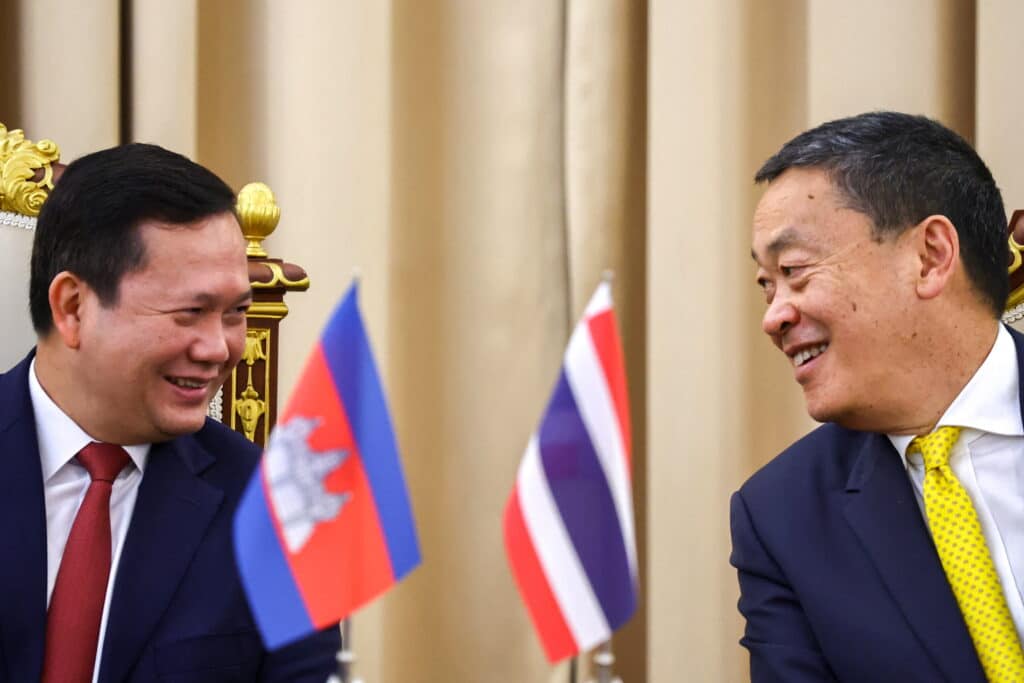By Chhay Lim Royal and Sovitou Long
Despite their status as immediate neighbours, the relationship between Cambodia and Thailand has undergone significant shifts in recent years. This has generally been influenced by a complex interplay of domestic politics, economic interests and historical antagonism.
While past conflicts — such as the 2008 Preah Vihear Temple disputes — have left their mark, the ‘love-hate relationship’ has been restored. Ever since former prime minister Yingluck Shinawatra’s administration in 2011, the relationship — for the most part — has been cooperative. Even following Thailand’s 2014 coup and the crackdown on illegal Cambodian migrant workers, the governments of former Cambodian prime minister Hun Sen and former Thai prime minister Prayut Chan-o-cha understood that they had to coexist peacefully as neighbours. They recognised their economic interdependence, prompting them to reset diplomatic ties and prohibit any opposition forces within their respective territories.
Political dynamics within the current administrations continue to enhance the two countries’ ties. Some attribute this improvement to the personal ties between former prime ministers Hun Sen and Thaksin Shinawatra, suggesting that their legacy continues to influence the new generation leadership under Cambodian Prime Minister Hun Manet and Thai Prime Minister Srettha Thavisin.
Territorial disputes have been a key focus in Cambodia–Thailand neighbourhood diplomacy. Following the resolution of the Preah Vihear conflict, their foremost concern is the overlapping maritime claim in the Gulf of Thailand — a region potentially holding up to 11 trillion cubic feet of natural gas. The longstanding dispute over this area is a potential flashpoint, particularly if bilateral negotiations are influenced by rising nationalistic politics and mismanagement.
This issue was high on the agenda for Manet’s visit to Bangkok in early February 2024, where the two countries agreed to discuss ‘joint exploration of the hydrocarbon resources in the overlapping claims area’. The way forward necessitates a revitalisation of discussions under the framework of the 2001 Memorandum of Understanding, seeking common ground for cooperation in energy security while acknowledging and working around the existing territorial disagreements. But this pursuit of peaceful coexistence may be complicated by the potential re-emergence of nationalism and hard-line views within Thailand’s internal political factions, particularly from conversative groups.
Equally significant and adding to the complexity is the issue of immigration border control. As Thailand has been a popular destination in ASEAN for Cambodian migrant workers, land border control remains a critical issue that contributes to illegal migration and transactional businesses. Effectively managing the movement of people crossing the land border between Thailand and Cambodia is imperative. Thailand currently hosts approximately two million Cambodian workers, with half of them lacking documentation. This often leads to labour exploitation and persecution by Thai authorities. In 2023, there was a mass arrest of Cambodian workers by Thai authorities, who were believed to have tortured illegal migrants.
Proper management of migration policy between Cambodia and Thailand should be a win-win issue. The increase in migration of Cambodian labour to Thailand has played a role in Thailand’s economic growth by providing a steady workforce in crucial sectors like agriculture, construction, fishing and manufacturing. In return, the remittances sent by these migrant workers to their families in Cambodia significantly contribute to the well-being of those families and the economies of their villages.
Another critical aspect that is often overlooked is people-to-people exchange, which is important for more meaningful Cambodia–Thailand diplomacy. Prioritising cross-border trade and investment is paramount, as flourishing business interactions along the border foster closer connections among people. This is likely to help diminish the politicisation of cultural sensitivity between the two nations. The two countries should revitalise the spirit of turning ‘a battlefield to a marketplace’, which was Thailand’s firm commitment during the Cambodian peace construction period in the 1990s. The new generation of leadership should invest more effort in enhancing transactional business exchange and creating investment opportunities along the land borders.
While Cambodia has established interoperable payment remittance systems with Thailand through the QR code cross-border payment system, actual investment and bilateral trade between the two nations remain relatively low compared to other neighbours. The volume of two-way trade in 2020 reached only half of the US$15 billion target set in 2015. Closer cross-border trade between Cambodia and Thailand will help facilitate stronger regional connectivity, especially along the Southern Economic Corridor, a vital trade route for the Greater Mekong Subregion.
Cambodia and Thailand share a rich cultural heritage, but the rush to claim cultural ownership can sometimes spark unnecessary conflict. In addition to collaborative efforts to combat fake news, both governments should actively encourage initiatives that facilitate direct dialogue and cultural appreciation.
Beyond the political complexities and sensitivities, Cambodian–Thai diplomacy carries profound implications for peace and stability across Southeast Asia. While the rise of nationalism and populism poses a challenge, it is crucial for both Cambodia and Thailand — alongside their regional counterparts — to approach these dynamics with a commitment to open dialogue and understanding. They should promote closer people-to-people exchanges and ensure that the shared goals of peace, stability and prosperity prevail over divisive tendencies.
Chhay Lim is Visiting Fellow at the Centre for Southeast Asian Studies, Institute for International Studies and Public Policy, Royal University of Phnom Penh.
Sovitou Long is a Junior Researcher at the Center for Southeast Asian Studies and Lecturer at the Institute for International Studies and Public Policy, Royal University of Phnom Penh.
Source: https://eastasiaforum.org/2024/03/27/the-past-present-and-future-of-cambodia-thailand-relations/




